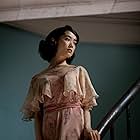Toru recalls his life in the 1960s, when his friend Kizuki killed himself and he grew close to Naoko, Kizuki's girlfriend, and another woman, the outgoing, lively Midori.Toru recalls his life in the 1960s, when his friend Kizuki killed himself and he grew close to Naoko, Kizuki's girlfriend, and another woman, the outgoing, lively Midori.Toru recalls his life in the 1960s, when his friend Kizuki killed himself and he grew close to Naoko, Kizuki's girlfriend, and another woman, the outgoing, lively Midori.
- Director
- Writers
- Stars
- Awards
- 4 wins & 9 nominations total
- Student Activist
- (as Kohei Yoshino)
- Director
- Writers
- All cast & crew
- Production, box office & more at IMDbPro
Featured reviews
All that remains now is nostalgia.
And that is why, critically acclaimed Japanese writer Haruki Murakami's novels spoke to so many people. His works poignantly captures the spiritual emptiness of the modern generation and explores the loss of human connection in the bustling society we live in today. And just when detractors thought that Murakami's bestselling 1987 novel was un-filmable, along comes Tran Anh Hung, whose past works include the award winning Cyclo (1995) and The Scent of Green Papaya (1993).
Set in Tokyo during the late 1960s, the film's male protagonist is Toru, a quiet and serious college student. He loses his best friend to suicide, and his personal life is thrown into turmoil. He becomes emotionally closer to his friend's ex-girlfriend Naoko, who shares the same sense of loss. Circumstances bring Naoko to a sanatorium, and Toru becomes devastated. Another girl, Midori, enters his life, and he realises that she is everything Naoko isn't. Torn between two women and feeling empty about life's past and future, what ensues is Toru's nostalgic journey of loss and sexuality.
The above synopsis probably doesn't do justice to Murakami's writing, which is known to be humorous and surrealistic. While we haven't read the original novel which this 133 minute film is based on, we have chanced upon Murakami's other works, and we must recognize Tran's decision to adapt the story into a feature film.
The first thing which grabs you is the hypnotically mesmerizing cinematography by the award winning Lee Ping Bin (In the Mood For Love, Three Times). The breathtaking mountainous landscapes of Japan are captured on Lee's lenses like gems. You can imagine yourself wandering through the green grasslands and the snowy grounds, letting the spectacle engulf your senses. To replicate the mood of 1960s, production designers Norifumi Ataka and Yen Khe Luguem have painstakingly created scene after scene of the film's characters journeying through life's alleys against backdrops of intricately decorated cafes, workshops and hostel rooms. The result is a visually pleasing mood piece which displays the director's eye for details. The soundtrack composed by Radiohead guitarist Jonny Greenwood completes the viewing experience with an enigmatic score.
Also commendable are the cast's performances. Playing Toru is Kenichi Matsuyama (Death Note's "L"). He has an empathetic vulnerability which leaves a lasting impression with viewers. Rinko Kichuki (Babel) displays the much needed frailty of Naoko's character without becoming overly melodramatic, while newcomer Kiko Mizuhara is charming as the charismatic Midori.
Like most literary adaptation, this film loses some of the novel's poignancy when it comes to character and plot development. Emotions are conveyed through convenient voiceovers, and the exploration of sexuality may appear preposterous to those who uninitiated to Murakami's works. Furthermore, the slow and meandering pacing of the two odd hour film may be a test of patience to some.
It will take audiences who are familiar with the postmodern writer's work to appreciate this film. If you are an individual who often indulges in poetic wistfulness, this may just be the perfect film for you on a contemplative evening too.
- www.moviexclusive.com
Readers of the book will be disappointed because the characters feels too shallow and underdeveloped, while general viewers will leave the cinemas with a big question mark. I won't begin to mention all those small bits of information in the film that are never explained unless you happened to have read the book. That's OK with me by all means, since I have read the book, but either way neither party should be pleased with the film.
Both book and film are very Japanese. So be prepared for a slow pace, allowing you plenty of time to catch up with its story. Be prepared for a Japanese styling as well. The film also follows the book's plot, more precisely than we are used to in our Western world.
Nou doubt the film 'Norwegian wood' peaks with its acting. Here we talk true Japanese high quality. The unfortunate contrast is made by its disappointing picturing. One can only guess if this is due to a lack of money, or to the desire to apply to 1969-shooting methods.
All in all 'Norwegian wood' is an enjoyable & well made film, allowing you a pleasant evening in the cinema. Those around in 1969 will get themselves carried back to their young days.
Scored by Jonny Greenwood with some narration by Watanabe, the film takes place in Tokyo in 1967 in the midst of student protests against the War in Vietnam. Trying to ease the pain of the shattering loss of Kizuki (Kengo Kora), a close friend from high school, Watanabe immerses himself in his studies at school where he is majoring in drama and, with Nagasawa (Tetsuji Tamayama), an older and more experienced friend, is able to release his tension by going to bars and picking up girls for sex. Things change, however, when Kizuki's former girlfriend, the beautiful but emotionally fragile Naoko (Rinko Kikuchi), shows up in Tokyo and reaches out to Watanabe for consolation. Though their language is exceedingly frank and sexually explicit, it is vital to understanding the characters and never used to titillate.
Their deepening relationship, however, only brings the feelings of loss closer to the surface and Naoko's ensuing emotional breakdown causes her to leave Tokyo for psychological rehabilitation at a mountain retreat where she is only able to see Watanabe intermittently. Even on occasional meetings, however, they embrace a dark ecstasy that inures them, at least temporarily, from their mutual grief, but when Naoko's roommate, music teacher Reiko (Reika Kirishima), sings the Lennon and McCartney song "Norwegian Wood" at Naoko's 20th birthday party, the line "and when I awoke, I was alone, this bird had flown," evokes tears that flow naturally.
Paralyzed by her sadness and feelings of responsibility for Kizuki's death, Naoko sinks deeper into despair and Watanabe's vows of lifelong fidelity are compromised by his attraction to Midori (Kiko Mizuhara), a smart, outgoing student who also has had to overcome a troubled past. Norwegian Wood is not a film about "teenage angst," or any other of the favorite catch phrases that substitute for empathy, but about the essence of life itself and the anguish of having to let go of attachments. More of a tone poem than a free-flowing narrative, the film creates an indelible experience of both exquisite beauty and aching pain, perhaps two sides of the same coin. Like the under-appreciated Tony Takitani, another film based on a story by Murakami, Norwegian Wood unfolds like a dream, evoking a mood of serenity and contemplation.
Supported by the stunning cinematography of Ping Bin Lee, much of the film's power takes place in the silences that allow us to simply observe the sublime beauty of the countryside, its forests, waterfalls, and the purity of its winter landscapes. While some may try, the film's emotional roller coaster cannot be filtered out and, in the process of assimilating it, it builds a quiet power that ensnares us and leaves us to explore its meanings long after the final credits. In spite of those who want to attach the label of "boring" to every film that moves slowly and requires concentration, Norwegian Wood will be remembered as one of Hung's best films and a work that brought cinema to a new level of artistic achievement.
The cinematography of Norwegian Wood is excellent. So if you are big on cinematography, then this would be a good film to watch. Otherwise? Not so sure... I myself find the character of Watanabe very unappealing, and his appeal to Japanese women rather baffling, but maybe that's just a cultural difference.
Did you know
- TriviaThis is only Jonny Greenwood's second film score, following his acclaimed work on There Will Be Blood (2007). Greenwood was keen to score the film as he was a big fan of the novel. His involvement was in some doubt, however, as Thom Yorke wanted to return to the studios to record a new Radiohead album. Greenwood found the time to balance both projects.
- Quotes
Toru Watanabe: Nothing can heal the loss of a beloved. No truth, no sincerity, no strength, no kindness can heal that sorrow. All we can do is live through the sorrow and learn something from it. But whatever we learn will be of no help in facing the next sorrow that comes along.
- Alternate versionsThe German TV version is 10 min shorter.
- ConnectionsFeatured in At the Movies: Venice Film Festival 2010 (2010)
Details
- Release date
- Country of origin
- Official sites
- Language
- Also known as
- La ballade de l'impossible
- Filming locations
- Production companies
- See more company credits at IMDbPro
Box office
- Gross US & Canada
- $13,000
- Opening weekend US & Canada
- $13,000
- Jan 8, 2012
- Gross worldwide
- $19,144,719
- Runtime
- 2h 13m(133 min)
- Color
- Sound mix
- Aspect ratio
- 2.35 : 1



























